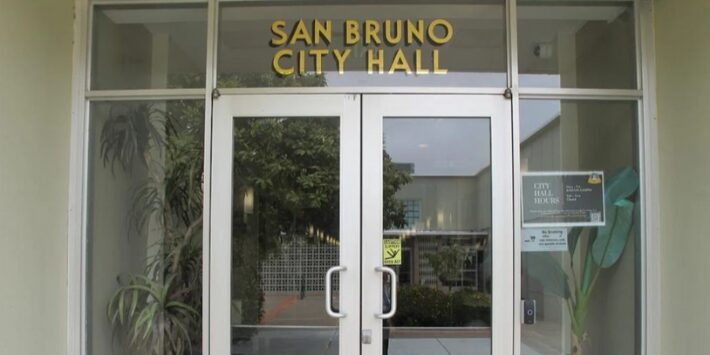City claims accommodations made; CAIR alleges indoor fast-breaking, prayer denied
The Council on American-Islamic Relations is demanding an apology and policy clarification from San Bruno after the city denied residents indoor space to pray and break their Ramadan fast while attending a March 12 City Council meeting.
The nation’s largest Islamic civil liberties group issued a formal complaint letter to San Bruno Mayor Rico Medina on March 21, calling the incident “not only deeply troubling but indicative of a broader pattern of exclusion and Islamophobia.”
The city said in a statement posted to its website March 22 that it had attempted to create an outdoor space for those wanting to break their fast in the time frame given and that individuals “rejected” the accommodations by bringing food and drink in the lobby.
“We are sorry representatives from CAIR do not feel enough was done to accommodate their wishes in San Bruno at last week’s City Council meeting,” the city said in a statement posted to its website March 22. “The city did its best, under a very short deadline, to set up tents and create an eating area outside of the City Council chambers (where the city’s business is conducted) to accommodate their request.”
Palestinian, Arab and Muslim residents and their allies have regularly been attending San Bruno City Council meetings to advocate for a cease-fire resolution. San Bruno resident Matt Jones sent several requests on the group’s behalf, beginning March 11, asking for space and accommodation for constituents to break their fast for the second day of Ramadan in the City Hall lobby.
San Bruno City Clerk Lupita Huerta responded several hours before the meeting that residents could not be accommodated indoors because the lobby was not available for “private use” during council meetings but the mayor had recommended the city provide tables, chairs and a canopy outside.
San Bruno resident Kamilah Albahri — alongside around eight other community members trying to break their fast, some for religious reasons and others in solidarity with Gaza — was immediately met with police presence requesting they go outside to tables set up underneath police canopies.
The experience was jarring, Albahri said, particularly because the lobby of City Hall, containing a vending machine and snack kiosk, is often used for community hangouts and eating. Additionally, the outside area was unpleasant and cold at night, located directly next to a major road.
“I was pleading with the officer, ‘we’ve been fasting all day, we want to have a piece of pizza.’ This isn’t a private party or private gathering, this is a religious right I’m trying to exercise,” she said. “It’s humiliating to walk into a space meant for communities to hang out and being sternly told by a police officer you have to go outside.”
Councilmember Tom Hamilton said that the way the situation transpired was “very unfortunate” and he did not agree with it. Hamilton, alongside Councilmember Marty Medina, met with community members directly affected by the situation on March 21, Marty Medina said.
“We have shared their request to meet with the mayor, city manager, and police chief, at the earliest convenience for all attendees,” Marty Medina said in a statement. “The intent of the meeting is to ‘regroup’ and have a broad discussion of the recent interactions between the council, staff and community.”
Councilmember Michael Salazar said he was not present at the March 12 meeting and was still learning the full extent of what transpired but hoped the city would look into the matter.
“It’s really unfortunate. I understand how some members of the community felt disrespected by what happened. I don’t think that was the intent, but clearly they were very offended by what happened, and I’m not exactly sure why it transpired,” he said.
Rico Medina, Councilmember Sandy Alvarez and City Manager Alex McIntyre did not respond to requests for comment.
Jones said that the interaction did not inspire confidence that residents could go to the city with their needs, and that interactions between police and those observing the holy holiday were not fruitful despite efforts to explain their position.
“‘Let’s de-escalate, let’s talk about this, no one has been returning our calls,’” he said of the conversation. “There’s no sitting representative who has been willing [to talk.] To me, that is really, really just poor quality public service.”
Fundamentally, the instance was a cultural competency issue, Albahri said. Regardless, she added San Bruno’s Palestinian, Muslim and allied communities will persist in organizing toward a cease-fire initiative, originally voted down by the City Council in November.
“Our community is committed to a cease-fire initiative. We have hope that a resolution can pass in our city. As a community we have been ignored and sidelined,” she said. “As mentioned in the CAIR letter, our community is open to dialogue, sitting down discussing what happened. We are also open to an apology and we will move past this.”
